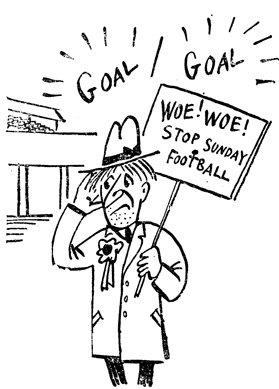
Football
* (football - rugby league football is a thirteen-a-side handling game with an oval ball, played by both amateurs and professionals, which began in 1893 when 22 clubs in Lancashire and Yorkshire broke away from the Rugby Union because it forbade professionalism; rugby union football is a fifteen-a-side handling and kicking game played with a oval ball, on a field 110 by 75 ft, the basic aim being to score a "try" by grounding the ball behind the opponents' line; the Rugby Union was formed in 1871; the game takes its name after Rugby school in Warwickshire, England, where it was played in the early 19th century.)
The history of football goes back almost as far as that of cricket. Here is a quotation from a set of rules: do you recognize the game?
"The players form two sides, and the game is started by throwing the ball into the air from a half-way line separating the teams. As soon as the ball is in the air, the players make a dash for it, the aim being to run with the ball and touch it to the ground upon a line behind the opponents."
Rugby Union, you think? The game which resulted from an afternoon at Rugby School in the early part of last century, when William Ellis picked up a football and ran with it?
No; these rules were written down eighteen hundred years before Ellis was born, by Roman soldiers who played the game and called it "Harpastum".
Football in the Middle Ages in England was played by teams formed of whole villages, and there were no very clear rules. With as many as a hundred people on each side, the teams struggled to score goals with a ball made of the inflated bladder of a pig. You could attack the ball, or you could attack members of the opposite team instead. In some villages the annual football match was regarded as a perfect opportunity to settle grievances against neighbours, who during the course of the game could be thrown into the duckpond. There were many injuries, some of them serious, and several times laws were passed to forbid the game, not only because of these injuries but because it interfered with practice for archery, which in those days was not so much a sport as an essential part of national defence.

Football became a more orderly game in the nineteenth century, and eventually a group of keen players met to form the Football Association, the parent body of Associations all over the world and of the International Football Association (F. I. F. A.),* which sees that rules are universal, and also runs the World Cup Competition every four years.
* (F. I. F. A. - (Fr.) Federation Internationale de Football Associations, International Federation of Football Associations.)
But the formation of the Football Association did not end all of the game's troubles. Some clubs played the round ball game, with penalties for holding the ball; others preferred the Rugby style. Sometimes, to make it fair for both clubs, the first half of the match had to be played under F. A.* rules and the second half under the Rugby code. It took many years to sort out football into its various groups, but finally the F. A. took charge of professional football, the A. F. A.** of the same game played by amateurs. The Rugby Union covers the "handling" game when played by teams of fifteen amateurs; a slightly different game with thirteen players, who may include professionals, comes under the Rugby League. Another brand of football is played under what are called "Australian Rules", and a further set of rules is used by the heavily padded and protected players of American football.
* (F. A. - Football Association, founded in 1863.)
** (A. F. A. - Amateur Football Association.)
But soccer - the game as played under F. A. rules - is the most widespread, and in its hundred years has seen many developments. In the early days of the Football League competition in England, professionals were barred from taking part, and there were bitter struggles between the League and many clubs who secretly paid their players under a system known as the "guinea in the boot". A player who had done well would find a guinea in the toe of his boot when he changed back into his ordinary clothes after the match. Another way in which club directors broke the rule was by employing players as their "coachmen" - sometimes players who had never been within yards of a horse! A similar battle in the Rugby Union led to many clubs leaving the Union and setting up the League, in which professionals are permitted, though they must also have another job.
Football Pool. Competition in Which money prizes are offered for forecasting correctly the results of League football matches in Great Britain. Most promoters offer two types of competition, one involving selection of a given number of results from a long list of matches, the other involving all results in a short list. Minimum stake is usually 6 d., and dividends are calculated by dividing the amount of stake money (less expenses and commission) by the number of correct or most nearly correct forecasts. Postal expenditure on pools in the U. K. is estimated at £ 2,000,000 a year, not counting £ 1,000,000 in poundage on postal orders.
|
ПОИСК:
|
© GENLING.RU, 2001-2021
При использовании материалов сайта активная ссылка обязательна:
http://genling.ru/ 'Общее языкознание'
При использовании материалов сайта активная ссылка обязательна:
http://genling.ru/ 'Общее языкознание'